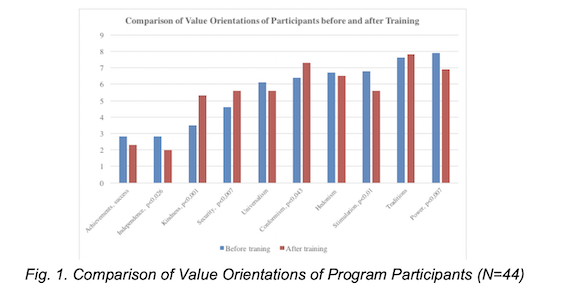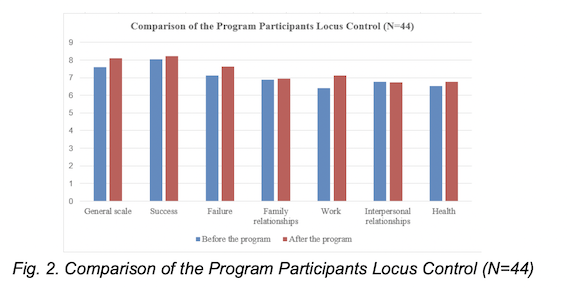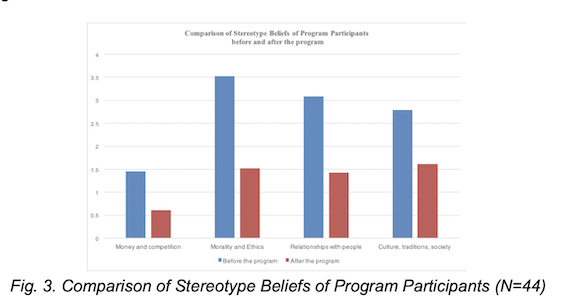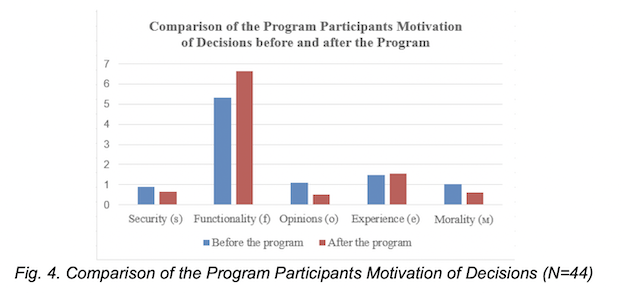Development оf leadership mindset using а method оf “Live Living”

Abstract
The article is devoted to the problem of developing a novelty-bringing leadership mindset of directors of secondary schools. Leadership mindset empowers school directors to bring novelty in schools including science teaching. However, studies show that school directors demonstrate high level of stereotypical thinking which impedes novelty-bringing leadership in their schools. Recent study of HAI.LT institute showed that directors and deputy directors of secondary schools demonstrated high degree of stereotyped thinking. The study in 2018 included 31 directors and deputy directors of Lithuania’s secondary schools. There was conducted a study of the personal characteristics of leaders in education - school principals in Lithuania. It showed that there is a high degree of adherence to stereotypes, low internality. Conformism and unwillingness to take responsibility were at the first place among the values orientations.
HAI.LT institute designed “Live Living” method to change stereotypical thinking and develop novelty-bringing leadership mindset. The method was tested prior and after the leadership training program for 44 business leaders in the period from 2013 to
2015. The method included cinematology, psychotea, authentication counseling, etc. activating direct experience neural networks (responsible for novelty behavior), instead of default mode neural networks (responsible for stereotypical behavior). The study revealed that training using method “Live Living” brought changes needed for novelty-bringing leadership mindset formation. The changes were observed in business leaders’ value orientations, importance of independence of action, stimulation, conformity, responsibility and internality, influence of stereotypes.
Those studies suggest that special leadership training program with the methods of experiencing life situations (direct experience of Live Living) is necessary not only for leaders in business, but for education system too. The study suggests that the method “Live Living” can be used for development of novelty-bringing leadership mindset of directors of secondary schools as a part of HR policy, programs for management development, etc. Development of leadership mindset of school directors allow them to create the school for the generation of the future.
Table of Contents:
1. Introduction
2. Previous Studies Review
3. Study’s conclusion
3.1 Methods of Research
1. Introduction
Leadership mindset empowers school directors to bring novelty in schools including science teaching. However, studies show that school directors demonstrate high level of stereotypical thinking which impedes novelty-bringing leadership in their schools. Recent study of HAI.LT institute showed that directors and deputy directors of secondary schools demonstrated high degree of stereotyped thinking.
The leadership in the sphere of business can be a flagship for school leadership in the context of rapid changes, since business leader has to cope with more and more challenges every year reaching business targets. A successful company today is a company where all employees have leadership mindset: they are creative and independent, goal oriented and feel responsible for the success of the company, not depending on their level. The epoch of global changes brings new tasks to managers and requires new approaches to their solution.
2. Previous Studies Review
The modern scientific approach to leadership implies an era of change, the internal environment of organizations is changing with the surrounding reality. [1]. The ability of the leader to respond in an adaptive manner to the emerging difficult situations is associated with the willingness to apply new strategies to overcome life situations.
Leaders with more developed self-regulation abilities are more successful, they are able to make effective decisions in a high-risk situation. A leader is a personality – a vector, the operational center of a variety of relationships and functions [2]. It is noted that it is important for the leader to have a deep and constant contact with the positive basic core of his own personality (Onto “In-se”). In onto-psychology, an organization is called the leader’s “social body” [3].
Self-regulation – the development of leadership potential – organizational changes – this is the scheme on which authentication counseling of leaders is based. The leader has a special mindset: he/she is able to implement the project and coordinate the actions of other people, based on the novelty of the situation. According to the study by the Corporate Executive Board (CEB), 66% of firms have programs on identification and promotion of employees with high potential. However, the top- managers of only 24% of firms consider such programs effective [4].
For the formation of personal qualities of a leader, it is necessary to take into account the latest research in the field of neuropsychology: the existence of two main neural networks of the brain – the constant activation network (default) and the direct experience network (successful). For the development of creativity of the leader, it is necessary to change the default mode system which blocks the potential [5].
In order to break out from automatic reactions of the brain and create novelty, leader needs to reflect on his/her emotional reactions that arise in situations of real life – live living. For this purpose, special leadership training programs are being developed in which the methods of experiencing life situations are applied (cinelogy and psicotea – spontaneous theatre).
3. Study’s conclusion
Thus, techniques for experiencing life situations can develop leadership qualities when they are included in the programs of work with leaders. AUTHENTIQUS program of consciousness leadership is a modular training program conducted by the HAILT institute since 2011. I
n the course of work, participants expand the boundaries of their thinking, restore the integrity of consciousness and get rid of the negative influence of personal and social stereotypes, change the default mode system to the direct experience system.
The personal characteristics of the leaders were measured before and after the training: value orientations at the level of behavioral priorities, locus of control, stereotypical beliefs, motivation of decisions.
3.1 Methods of Research
1. The method of S. Schwarz for studying the value orientations of an individual is a scale.
2. The technique of G. Rotter “The level of subjective control” in various areas of life: family relationships, work, interpersonal relationships, health and illness.
3. “Test for the identification of stereotypical beliefs” (by Vilius Adomaitis)
4. “Motivation of decisions” test.
The obtained data was processed in Excel and the statistical package SPSS. Statistics. 20. The non-parametric Wilcoxon criterion was used for the analysis to compare dependent samples.
The study of the personal characteristics of the leaders involved 44 people enrolled in AUTHENTIQUS program of consciousness leadership. The purpose of the study: a comparative analysis of the psychological characteristics of participants before and after participation in the program. The results showed that after passing the program, participants had a statistically significant change in value orientations (Fig. 1), the participants began to value more the ability to make decisions independently.

The results suggest that the value of autonomy became more significant. Conformism also got into the top three less significant values.
The second indicator measured before and after the program was the “locus of control”. There are two types of locus of control: external and internal. Internality/ externality in the field of achievements means attributing responsibility for one’s own success or destiny. Internality/externality in the field of failures – a person is responsible for his failures himself or shifts responsibility to others.

The overall internality of the participants (Fig. 3) increased significantly after the training from medium to high. This suggests that the program participants began to take more responsibility for their lives.
The test on identification of the stereotypical beliefs by V. Adomaitis (developed at the Department of Onto-psychology of St. Petersburg State University) also showed changes.

At the end of the program, the percentage of stereotyped responses significantly declined in all categories, decrease in the stereotyped thinking is an indicator of leadership development (Fig. 3).
The “Motivation of decisions” test also showed significant changes compared to its indicators before the program.

Participation in the program further strengthened the existing trends: the significance of the functionality of the result increased, and the significance of the opinions of others and moral criteria became even lower (Fig. 4).
4. Conclusion
Studies presented in this article suggest that special leadership training program with the methods of experiencing life situations (direct experience of Live Living) is necessary not only for leaders in business, but for education system too.
The study suggests that the method “Live Living” can be used for development of novelty- bringing leadership mindset of directors of secondary schools as a part of HR policy, programs for management development, etc. Development of leadership mindset of school directors allow them to create the school for the generation of the future.
The major aspect is the development of the so-called direct experience neural network which develops the potential, instead of the default mode neural network, which blocks the potential. The development of the leaders’ potential (the work of the direct experience neural network) is indicated by the changes obtained by comparing the results before and after the program.
The study proves the need for theoretical and practical training for leaders and teachers with application of special techniques. Leadership training programs develop creative thinking and provide skills for the behavioral use of creativity in business and educational practice.
Contributo selezionato da Filodiritto tra quelli pubblicati nei Proceedings “8th International Conference New Perspectives in Science Education- 2019”
Per acquistare i Proceedings clicca qui.
Contribution selected by Filodiritto among those published in the Proceedings “8th International Conference New Perspectives in Science Education - 2019”
To buy the Proceedings click here.



